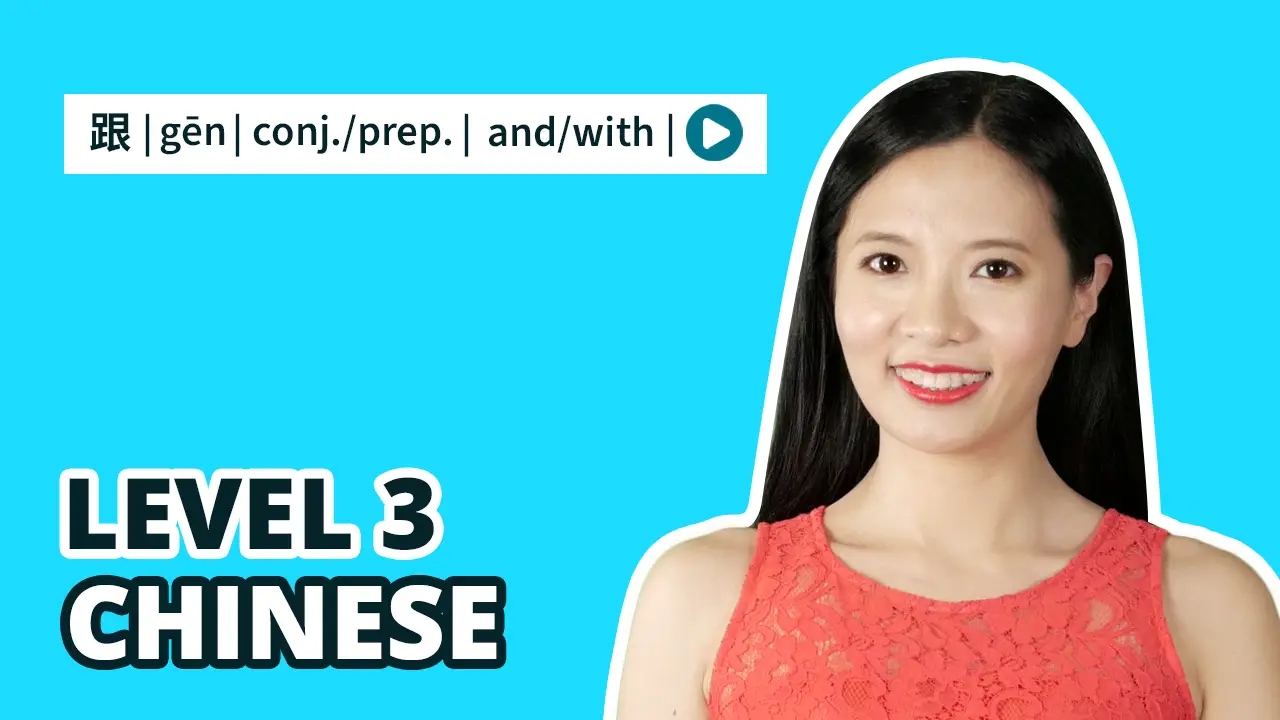Level 3 Lesson 10.1 – 月亮 太阳 云 朵 声音 钥匙 饱 好久不见
HSK 3+ VOCABULARY: 月亮 太阳 云 朵 声音 钥匙 饱 好久不见
In this video lesson we'll learn the vocabulary in Lesson 10 and practice them with a lot of example sentences. For new Chinese characters, we'll learn how to write them and know about their structures and origins in the attached writing sheet.
- VOCABULARY: 月亮 太阳 云 朵 声音 钥匙 饱 好久不见
- CHINESE CHARACTERS: 亮 阳 朵 云 声 钥 匙 饱
VOCABULARY LIST
VOCABULARY USAGE
1. 月亮 yuèliang · HSK 3
n. 名词 míngcí ▸ the moon
- yuèqiú
月球
the moon (as a scientific term) - dàdà de yuèliang
大大的月亮
[approving] (very) big moon
- Jīntiān shì shíwǔ, yuèliàng yòu dà yòu liàng.
今天是十五,月亮又大又亮。
Today is (the) 15(th) (of the Chinese Lunar Calendar), the moon (is) big and bright. - Yuèliang chūlai le.
月亮出来了。
(The) moon (has) come out. - Wǒ xiǎng zhīdào, yuèliang shang yǒu rén ma?
我想知道,月亮上有人吗?
I want to know, are there “people” (on the) surface (of the) moon?
2. 太阳 tàiyáng · HSK 3
n. 名词 míngcí ▸ the sun
- yángsǎn
阳伞
sun umbrella - tàiyáng jìng
太阳镜
sunglasses - hónghóng de tàiyáng
红红的太阳
[approving] (very) red sun
- Zhè ge yuè tiānqì dōu hěn yīn, jǐ tiān méi jiàndào tàiyáng le.
这个月天气都很阴,几天没见到太阳了。
This “ge” (of) month (has been) all very cloudy, (for) a few days (I/we/…) (have) not seen (the) sun (already). - Jīntiān shì yīntiān, tiān shang méiyǒu tàiyáng.
今天是阴天,天上没有太阳。
Today is (a) cloudy day, on (the) sky there is no sun. - Niǎor men fēi xiàng tàiyáng.
鸟儿们飞向太阳。
(The) birds fly towards (the) sun.
3. 云 yún · HSK 4
n. 名词 míngcí ▸ cloud
4. 朵 duǒ · HSK 5
m.w. 量词 liàngcí ▸ measure word for cloud, flower, etc.
- yì duǒ yún
一朵云
one (single) “duo” (of) cloud - báiyún
白云
white cloud - yǔyún
雨云
rainy cloud
- Tiān shang méi yǒu yún.
天上没有云。
There is no cloud on (the) surface (of the) sky. - Gāogāo de tiān shang yǒu jǐ duǒ báiyún.
高高的天上有几朵白云。
There exists a few “duo” (of) white clouds on (the) (very) high sky surface. - Tiān shang de yún nàme bái, nàme duō.
天上的云那么白,那么多。’
Clouds on (the) sky surface (are) that white, that many.
5. 声音 shēngyīn · HSK 3
n. 名词 míngcí ▸ sound; voice
- yǔshēng
雨声
rain sound - kūshēng
哭声
sound (of people) crying - xiàoshēng
笑声
laughter; sound (of people) laughing
- dàshēng
大声
big/loud sound(ing); loud - xiǎoshēng
小声
small/low-in-volume sound(ing)
- Tā dàshēng shuō: “Wǒ tèbié shēngqì.”
他大声说:“我特别生气。”
He says loudly, “I (am) especially angry.” - Tā xiǎoshēng shuō: “Nǐ xiěcuò le.”
她小声说:“你写错了。”
She says in low voice, “You wrote (it) wrong.”
- Nà shì shéi de shēngyīn?
那是谁的声音?
Whose voice is that? - Shénme shēngyīn nàme dà?
什么声音那么大?
What sound (is it that is) that loud? - Diànhuà li shì yéye de shēngyīn.
电话里是爷爷的声音。
In (the) phone (it) is grandpa’s voice. - Zài zhèr néng tīngjiàn jiàoshì li xuésheng men de dúshū shēng.
在这儿能听见教室里学生们的读书声。
In here (we/you) can hear (the) sound (of) students reading books in (the) classroom.
6. 钥匙 yàoshi · HSK 4
n. 名词 míngcí ▸ key (for opening a door)
- yì bǎ yàoshi
一把钥匙
one “ba” (of) key - bàngōngshì yàoshi
办公室钥匙
office key - chē yàoshi
车钥匙
vehicle key
- Zhè bǎ shì jiā li de yàoshi, nǐ ná hǎo, měitiān dàizhe qù shàngxué.
这把是家里的钥匙,你拿好,每天带着去上学。
This “ba” (of key) is (the) key (of our) home, you seize (it) well, every day(, while) bringing (it,) go to attend school. - Zài jiā li zhǎo le zhǎo zìxíngchē yàoshi, kěshì méi zhǎodào.
在家里找了找自行车钥匙,可是没找到。
(I) at home looked for (the) bicycle key really quick, but (I did) not find (it). - Yàoshi bú zài xínglixiāng li.
钥匙不在行李箱里。
(The) key is not in (the) suitcase.
7. 饱 bǎo · HSK 3
adj. 形容词 xíngróngcí ▸ full (after eating)
- hěn bǎo
很饱
very full - méi bǎo
没饱
not full
❖ Note that we do not say ✗bù bǎo 不饱.
- Xièxie nǐ, zuò le zhème duō hǎochī de, wǒ chī de tèbié bǎo.
谢谢你,做了这么多好吃的,我吃得特别饱。
Thank you, (you) made so much tasty stuff, I ate especially full. - Nǐ shì bu shì méi chībǎo? Zài diǎn ge wàimài ba!
你是不是没吃饱?再点个外卖吧!
Is (it that) you (did) not eat-(with the result of)-(being)-full? Again order (one) “ge” (of) delivery food! - Tā bù xiǎng zài zhǎngpàng le, suǒyǐ xiànzài měi dùn fàn dōu bù chībǎo.
他不想再长胖了,所以现在每顿饭都不吃饱。
He (does) not want to get fat again, so now (for) every “dun” (of) meal (he) all (does) not eat enough.
8. 好久不见 hǎo jiú bú jiàn · N/A
phr. 短语 duǎnyú ▸ long time no see [used to say hi to someone you haven’t seen for a long time; it can be used face to face or in a letter, text message, etc.]
Hǎo jiǔ bú jiàn, wǒ zhēn xiǎng nǐ!
好久不见,我真想你!
Long time no see, I (have) really missed you!
A: Guān Lǎoshī, hǎo jiǔ bú jiàn!
关老师,好久不见!
Teacher Guan, long time no see!
B: Lǐ Lǎoshī, wǒ hái bù zhīdào nǐ yǐjīng cóng Fǎguǒ huílai le! Zhēnde hǎo jiǔ bú jiàn le!
李老师,我还不知道你已经从法国回来了!真的好久不见了!
Teacher Li, I still (did) not know you already came back from France. (It was) really long time no see (already)!
